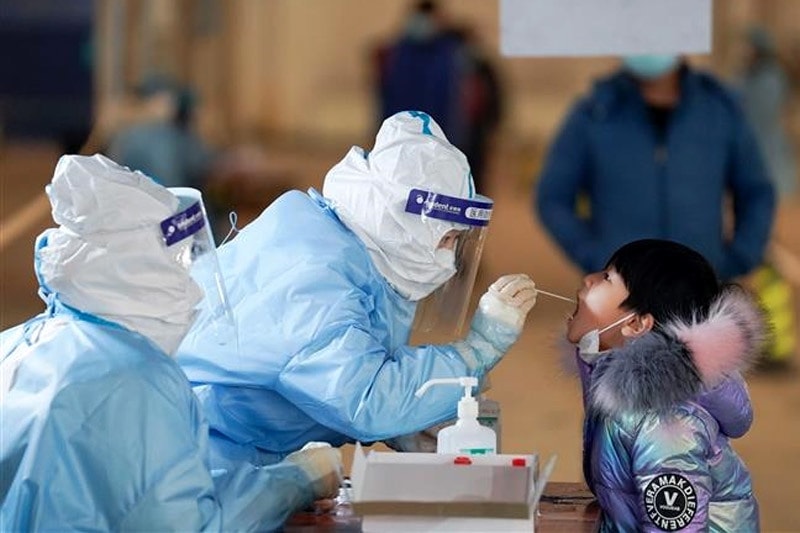World against pandemic: UN asks China to cooperate in Covid-19 investigation
The United Nations has asked China to cooperate with a new World Health Organization (WHO) investigation into the origins of Covid-19, according to the office of UN Secretary-General António Guterres.
"We call on all member states, including China, to cooperate fully with WHO and if WHO believes they need further information, we hope all will respond," UN deputy spokesman Farhan Haq said on July 23.
|
| Medical staff take samples for Covid-19 testing in Daxing district, Beijing, China. Photo: Xinhua |
According to Sputnik, the statement was made a day after Beijing condemned the WHO for its plan to promote phase 2 investigation into the origin of the new coronavirus.
China's National Health Commission called the plan "insulting" and a support for the theory that the virus leaked from a Beijing lab, which Chinese officials have long denied. China's Foreign Ministry also expressed concern that the new investigation was politically motivated, aiming to blame Beijing for the pandemic.
China has refused to cooperate with the WHO in a second investigation after the organization revealed that the process would include “inspecting relevant laboratories and research institutes” operating in the area where the first Covid-19 cases were detected. Such a goal would likely put the Wuhan Institute of Virology in the WHO’s crosshairs, as the first cases were reported in the city in December 2019.
Philippines strengthens anti-epidemic measures
In an effort to contain the spread of the Delta variant, the Philippine government announced that it would ban entry for people from Malaysia and Thailand from July 25 to 31. Previously, the Southeast Asian country had imposed a similar entry ban on visitors from eight countries, including Indonesia and India.
The Philippines has so far detected 47 cases of the Delta variant, with nearly half of them being community transmissions. As of the morning of July 24, the total number of positive cases of the new coronavirus in the country has reached more than 1.5 million, of which nearly 27,000 patients have died.
In addition to further tightening capacity limits for indoor dining at restaurants, beauty salons, and religious facilities, authorities are also requiring all young people aged 17 and under to stay home, according to CNA. The new decision comes just two weeks after the government lifted a ban on minors going out that had been in effect since March 2020.
South Korea extends "semi-lockdown" of capital
To prevent a fourth wave of infections from spreading across the country, the South Korean government announced that it would extend the social distancing level 4, the highest warning level, for another two weeks in the capital and surrounding areas. Accordingly, Seoul, Gyeonggi Province surrounding the capital and the western port city of Incheon will continue to implement the current "semi-lockdown" until August 8.
The decision comes in response to a continued surge in cases in the capital region, which accounts for nearly 70% of the country's total new infections.
According to the Korea Disease Control and Prevention Agency (KDCA), in the past 24 hours, the country recorded 1,630 more cases, of which 1,574 were community infections, bringing the total number of cases nationwide to 185,733, including 2,066 deaths.
Israel tests pill vaccine
Israeli pharmaceutical company Oramed has received approval from Tel Aviv’s Sourasky Medical Center to begin clinical trials of its single-dose Covid-19 vaccine in capsule form on 24 volunteers who have not been vaccinated against the novel coronavirus. The oral version of the vaccine was developed by Indian pharmaceutical company Premas Biotech, RT reported.
Oramed announced in March that it was testing the vaccine in pigs and that the animals had produced antibodies after being given the preparation.
Trials of the pill-based Covid-19 vaccine are expected to begin in August after receiving final approval from the Israeli Ministry of Health, CEO Oramed Nadav Kidron told the Times of Israel. Kidron expressed confidence that the oral vaccine, which does not require refrigeration, will help the Jewish state strengthen its defenses against the Delta variant and be a “game changer” in areas with low vaccination rates.
Other notable news about the pandemic:
- According to Worldometers, as of early morning on July 24 (Vietnam time), the pandemic has affected 220 countries and territories, infecting nearly 193.9 million people, with approximately 4.2 million deaths. However, more than 176 million patients worldwide have recovered.
- The US is still the country most severely affected by the pandemic with nearly 35.3 million cases and 626,589 deaths. The number of new infections in the US is on the rise, averaging 43,609 cases per day in the past week, equal to 17% of the record level recorded on January 8. The US has administered nearly 340 million doses of Covid-19 vaccine, equivalent to about 51.8% of the population being fully vaccinated if each individual needs to receive 2 doses.
- New South Wales, Australia's most populous state, has declared a state of emergency after recording 136 new cases of Covid-19 in the community, as the Delta variant continues to spread rapidly and new clusters of cases have been detected among workers in essential services such as supermarkets and pharmacies. Australia has recorded 32,588 cases so far, with 916 deaths. Only 12% of the country's population has been fully vaccinated, ranking last among 38 OECD countries in terms of vaccination rates against the SARS-CoV-2 virus.
- New Zealand Prime Minister Jacinda Ardern announced on July 23 that the country will suspend non-quarantine entry from Australia for at least eight weeks, due to the outbreak in the neighboring country. This is the first time New Zealand has implemented this measure since the exemption decision took effect in April.
- The European Medicines Agency (EMA) has just approved the use of Moderna's Covid-19 vaccine for children aged 12-17. This is the second vaccine approved by the EU for use on minors.


